
It’s 2025, and the web doesn’t sit still. Sites are getting smarter, more guarded, and increasingly dynamic. Whether you’re scraping for personal projects, business insights, or just to fuel your own curiosity, the truth is simple: yesterday’s scraping tools won’t cut it today.
With Reddit limiting access, LinkedIn tightening the walls, and even basic search engines delivering geo-personalized content, a smart proxy setup is no longer optional — it’s essential. And if there’s one trend every scraper should be watching, it’s the rise of mobile proxies.
Why Scraping Is Still Worth It (and Still Working)
Despite all the hype about APIs and data partnerships, scraping remains the go-to for getting real, flexible access to the public web. People scrape for everything from product tracking to SERP snapshots, flight prices to customer sentiment.
The catch? Anti-bot systems are working overtime. Firewalls, rate limiting, fingerprinting — all designed to shut down bots. If you want to stay ahead of that, you need to rely on the best proxies for scraping — IPs that are clean, trusted, and responsive.
Why Mobile Proxies Are the Quiet MVP of 2025
Mobile proxies use IPs assigned to real smartphones on 4G and 5G networks. That means your requests come from traffic patterns that look just like any other mobile user scrolling Reddit, watching reels, or checking Google Maps. Sites hesitate to block these IPs — and that’s your opening.
Here’s why scrapers are gravitating toward the best mobile proxies:
- They rotate often: Carriers assign IPs dynamically, which helps avoid long-term bans.
- They mimic real users: Your requests blend in with actual user behavior — no red flags.
- They work where others fail: Some mobile-first platforms (Instagram, TikTok, even some ecom apps) serve full content only to mobile IPs.
With mobile web usage now dominating globally, scraping like a real user often means scraping like a mobile user.
Real Use Cases Where Mobile Proxies Dominate
Let’s talk about what’s happening right now — not theory, but real scraping wins from the field:
- Social platforms: Scraping public profiles, post engagement, or hashtags? Mobile IPs reduce blocks, especially when paired with headless browsers.
- Localized SERPs: If you care about how content appears in Tokyo vs. Berlin, mobile proxies let you target by location without drawing attention.
- Reddit data: With tighter API limits and growing anti-bot measures, mobile proxies are one of the few reliable ways in.
- In-app scraping: App store reviews, mobile-only deals, or in-app browser versions of content — all require mobile IP access.
Don’t Let Your Proxy Stack Be the Bottleneck
If you’re serious about scraping in 2025, you already know it’s not just about the script. It’s about the entire pipeline — headers, timing, rendering, and most importantly, your proxies.
The best web scraping proxies are purpose-built. They’re not just “free” IPs from a list you found on some GitHub thread. They’re residential, mobile, or dedicated IPs from real users in real places, giving you the trust score and uptime you need to scrape without friction.
Final Thoughts: Scraping Smarter, Not Harder
Web scraping is evolving fast. The old tricks — endless retries, naive header spoofing, or hoping your IP won’t get flagged — just don’t cut it anymore. But the need for web data? That’s not going anywhere.
If you’re hitting rate limits, running into geo-blocks, or watching your scraper break every week, don’t start from scratch. Just upgrade your access layer.
Mobile proxies aren’t a gimmick — they’re one of the smartest, most effective tools scrapers can use in 2025. Pair them with a clean strategy, and you’ll find that the web is still very much within reach.






